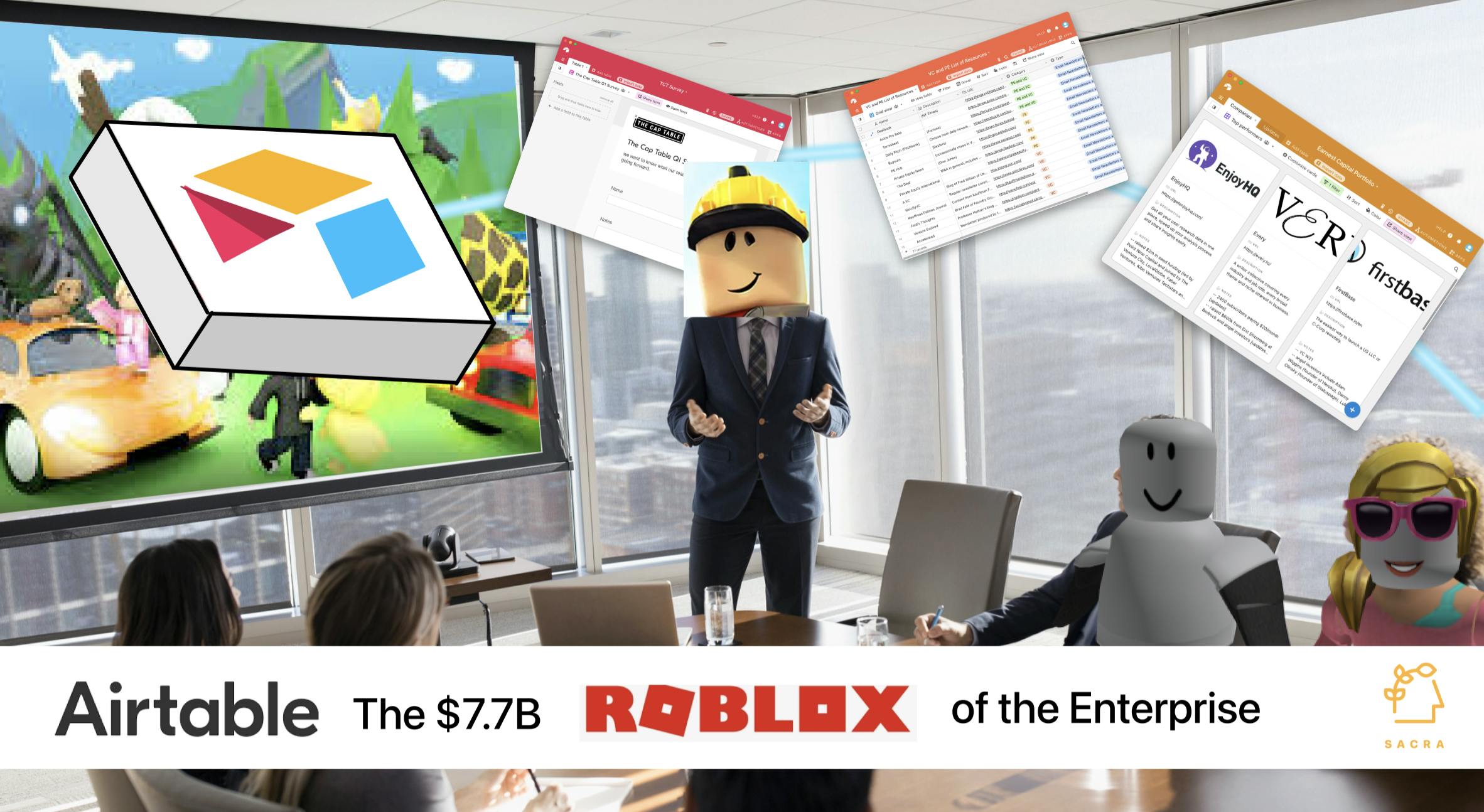Marketing agency chief operating officer on Airtable use cases and alternatives
 Jan-Erik Asplund
Jan-Erik Asplund
Questions
- Could you start by describing broadly the job to be done that Airtable provides your organization?
- What was the thinking behind the transition off of Airtable for the HR stuff?
- How do you like think about what Airtable's for versus what Asana is for? Because I think those two often get sort of conflated in terms of what they're for.
- Got it. And then both the two other functions, so content pipeline, content pipeline's a little more idiosyncratic. There's not that many tools for it, but sales CRM is pretty conventional. Do you think you would leave Airtable for a dedicated CRM?
- When you talk about slow loading, is that the app or like if you open the Airtable app and navigate to the table?
- How do most people interact with Airtable? Do people interact directly with the Airtable base?
- On the content pipeline front, have you guys looked at other products or other companies?
- Say you did transition the CRM off of Airtable and content. Do you imagine you would find some use for Airtable internally?
- What would be useful from if Airtable was to reach out and be like, "We can help you make this work, make it work as a CRM, make it work as content pipeline tool? Is there anything you can think that would be useful?
Interview
Could you start by describing broadly the job to be done that Airtable provides your organization?
Guest: Sure. So Airtable for us serves three core roles. First, the original reason we started using Airtable, it helps us manage our production pipeline to ideate, create and deliver content to our customers.
Second, it's a CRM, both for sales and for retention, so that we can keep track of how much our customers are worth and make sure that we are managing them throughout their customer life cycle. And then third, it serves as kind of like an HRIS for us, or it used to.
We actually moved away from that functionality earlier this year when we transitioned to BambooHR. So really two primary roles with some left over information related to people ops that we haven't fully transitioned out yet.
What was the thinking behind the transition off of Airtable for the HR stuff?
Guest: Yeah, so we wanted to be able to automate a lot of very manual processes. We were running onboarding in particular pretty manually through a sauna and tracking new hire information in multiple places. We wanted to centralize it and really use a tool that was built for a very specific function versus customizing something in Airtable that worked okay, but did not necessarily communicate as well with other tools as we wanted it to.
Or I guess it's less about communicating with other tools and more about not wanting to have to use a bunch of other tools, just having one thing that did a lot really well.
How do you like think about what Airtable's for versus what Asana is for? Because I think those two often get sort of conflated in terms of what they're for.
Guest: Yeah. So I guess Asana's for task management more so, and then Airtable is more of a system of record, both for like CRM and for production purposes. Yeah, that's how I think about it.
Got it. And then both the two other functions, so content pipeline, content pipeline's a little more idiosyncratic. There's not that many tools for it, but sales CRM is pretty conventional. Do you think you would leave Airtable for a dedicated CRM?
Guest: So we definitely will. Really, it's getting to a size where we can afford to hire someone who can focus on helping us both launch, implement and sustain that tool. We'll probably have our new customer onboarding manager take care of that, actually. So the main thing is bandwidth.
And the reason why we're thinking about it is because Airtable's pretty limited in... Like one of the main struggles I've had with Airtable, and I think other leaders have had, is reporting off of Airtable.
So I spent a while last summer, in particular, building out a bunch of custom dashboards in Airtable for sales, for our strategist team, both individually and then collectively for our GM. And you're pretty limited in terms of like the depth that charts, for example, can go to, like a number of different inputs that you can aggregate in a single chart, your ability to manipulate that information.
And then I think also as we grow, Airtable doesn't really grow with us in the way that we need it to. I remember when we worked with them, they said pretty directly that they don't want Airtable to be a backend for a website, for example, because it's kind of limited in the amount of storage per base.
And I think we're at a place where there's just too much information. It loads really slowly. So the functionality is not as robust as we need it to be to run our business efficiently. And then the speed of load just is too slow. Yeah.
When you talk about slow loading, is that the app or like if you open the Airtable app and navigate to the table?
Guest: Yeah. So it's slow both when I'm loading different views, but then very slow with all of the Airtable apps that I built out.
So I have a dashboard for each team that has say 10 to 15 different charts that show number of articles produced, number of articles produced by team member, customers on the team, revenue, like all of these different things that strategists need to track on a daily or weekly basis.
And that can take three to five minutes to load. So if I'm trying to see how each team is performing, I can't quickly jump between things. I have to go like very slowly, which is just a pain in the ass.
Guest: Yeah. I would say that like 20% or less of our team directly interacts with Airtable. The majority of the team interacts with Airtable through the software layer we built that sits on top of Airtable.
Yeah. I would say that like 20% or less of our team directly interacts with Airtable. The majority of the team interacts with Airtable through the software layer we built that sits on top of Airtable.
I'll actually share a tools and processes survey we just ran with you, which might be helpful because we did ask about Airtable. So like for example, we only got a third of the company to respond, but 50% of the people that responded said that they use Airtable weekly, which is probably the people who don't need to live in it.
They're outside of that 20%. 18% of our team, only six people. So remember it's like small sample size so that they have to use it daily.
So I think what's challenging about these results is that it's not disaggregated in a way that's actually that actionable for us.
Like we need to now do user interviews to understand the jobs that people are trying to have Airtable do for them and where they're getting stuck to understand, "Are these things that are solvable through training, through setting up different views or dashboards or is it just that Airtable's not the right tool for the job to be done?"
Like when I built dashboards out last year, I made a few. Sent them to the team, like, "What do you think?" Like, "Is this what you need?" They're like, "Yeah, I think so." I only got feedback from one person because only one person was able to articulate, like, "Here are all the questions that I want to ask in a given week or month. And here's how Airtable could support that."
On the content pipeline front, have you guys looked at other products or other companies?
Guest: Yeah. I think the big challenge in moving away there is one, just the amount of data that is already in Airtable to the amount of process that's attached to Airtable, because it's tied to so many other tools. We would really have to rethink at a foundational infrastructure level, what is needed from the tools and how all those integrations should work.
I think the big challenge in moving away there is one, just the amount of data that is already in Airtable to the amount of process that's attached to Airtable, because it's tied to so many other tools. We would really have to rethink at a foundational infrastructure level, what is needed from the tools and how all those integrations should work.
So I guess those are the main challenges. I still think we should consider it, but I think it's very possible we'll need to hire external help or bring in a contractor of some kind to help us make that transition. Happy to go into more depth there though.
Say you did transition the CRM off of Airtable and content. Do you imagine you would find some use for Airtable internally?
Guest: Probably not. I mean, we don't spend an obscene amount with Airtable. I think it's in the neighborhood of like 25K a year right now. I mean, that's not like a small amount of money, but like relative to some of our other tools, it's not crazy. If we were to move both of those things out, I do not see a use case for Airtable. No.
What would be useful from if Airtable was to reach out and be like, "We can help you make this work, make it work as a CRM, make it work as content pipeline tool? Is there anything you can think that would be useful?
Guest: Yeah. I think like one, just more space per base. So if we could just get more data and not have each base slow down so much. Two, I learned a lot talking with the UiPath team after their S-1 filing. They did a phenomenal job working through consulting firms to grow their business.
I do think that for any software that's going to touch a wide variety of teams and that is going to be best used in conversation with a bunch of different applications, having someone who has a ton of experience in how to best use the tool, who can make recommendations for your specific use case is helpful. Right now, Airtable is kind of like, "Okay. Just use it out of the box. Figure it out. Here's Airtable Universe. There are templates."
I think that works well at a small scale. At the size we're at, I would be happy to pay twice as much for Airtable if they gave me X hours of consulting per month, where they helped advise us on what we need to do next because I don't feel like that's accessible.
At the size we're at, I would be happy to pay twice as much for Airtable if they gave me X hours of consulting per month, where they helped advise us on what we need to do next because I don't feel like that's accessible.
And maybe that's not actually the case so I should research after this call. I think we would instead move to a platform that's built for those specific jobs that we need to accomplish. So yeah, I guess size and then expertise. Kind of like you see all these Notion maestros popping up that teach people how to use Notion do you know whatever, I could see that working well.
Is this part of my feedback though to like every vendor that we work with. I'm like, "Please be the expert and teach me how to be better at this than I am currently so that I'm not just spending all this time reading your how-to documentation to try to get up to speed."
I'd much rather pay someone for an hour of their time than take 10 hours of my time to do something so we could get to a solution faster.
Sacra: So it sounds like the big issues are speed. Like the product is just slow, this lack of extensibility. So it doesn't do a lot of stuff out of the box, which means you need other tools, but then there's a lack of kind of integration between them.
Guest: Right. Like you said, there's a really high ceiling, but I think that we're at a point where it's like, "Okay, I feel like we've taken Airtable"... Because we've already kind of figured out the, sorry, the data scheme, I guess, of our Airtable, we either have to rework it from the ground up or figure out how to build on top of it. So to get to that next level, even if the ceiling is a lot higher than where we are now, I do feel like we need someone to advise us.
I think it works for an enterprise company better maybe because they have ops people that spend all of their time thinking about how to best use this tool. They create process around it and then they have process to maintain it too. I think at my last company, once we got to 50 people, say, we had a Salesforce admin, like a dedicated person whose job was to get the most out of Salesforce.
I don't see us doing that for Airtable alone, but I totally see why it makes sense. That said, and I think this is why some some companies will actually hire a Salesforce admin if someone who already has a ton of knowledge in that tool.
Sacra: One of the potential issues we know with Airtable is that you have the folks who have that institutional knowledge of how a base works, and when they leave, you have a bunch of people using that base who didn't build it, and there's a big disconnect.
Guest: Totally. I think that's right. The institutional knowledge and then just overall, familiarity with tools. I think a lot of the people that come in and see our CRM, like, "That's not a CRM. A CRM is a," and they have a very specific mental model for what that is and should be, not necessarily understanding it... Like Salesforce does not work out of the box. There's a whole implementation process. So it's also very customizable and not perfect and always evolving.
I mean, I think Airtable is great. It really wasn't necessarily built for our use case. It works really well. Like I've talked to so many people who use Airtable as individual sales reps or solopreneurs. It works so well or smaller teams.
My dad uses it. I can even talk to him. He uses it to run his agency. There are a lot of people that really like it. I think that it could work really well. Again, we would just need to invest. We have to invest regardless. And like I said, I think it's the mindset shift and then also knowing, well can it grow with us in the way that we need it to? And I can't confidently say yeah. So I can't recommend that we continue long-term with it.
And maybe we're not worth enough, as a customer to... And if they invest in helping us solve our problems, they're still only going to get X amount of money out of us. So maybe it makes more sense to focus on the free, easy self-serve and then the bigger enterprise. I can kind of see that.
Disclaimers
This transcript is for information purposes only and does not constitute advice of any type or trade recommendation and should not form the basis of any investment decision. Sacra accepts no liability for the transcript or for any errors, omissions or inaccuracies in respect of it. The views of the experts expressed in the transcript are those of the experts and they are not endorsed by, nor do they represent the opinion of Sacra. Sacra reserves all copyright, intellectual property rights in the transcript. Any modification, copying, displaying, distributing, transmitting, publishing, licensing, creating derivative works from, or selling any transcript is strictly prohibited.










